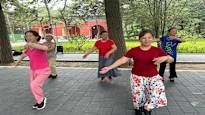China does not have a unified system for caring for the elderly. Many Chinese elderly have to take care of themselves.
BEIJING It’s early morning at Ritan Park in Beijing. Twenty members of the taiji group deprive their members of sleep.
At 54 years old Melanie Liu has an hour of training in front of him, where he practices the movements of the old martial art.
He wants to stay in good shape so that he can enjoy his retirement life next year.
– The oldest members of the group are 90 years old, but they look at most 70 years old. That’s what I strive for. I want to enjoy life, travel and do volunteer work, says Liu.
The Chinese Communist Party has decided to raise the retirement age, but the changes do not yet apply to Liu. The general retirement age for women is currently 55, for working women 50 and for men 60. The party has not yet said when the age limits will be increased.
Liu’s future pension is higher than the average monthly pension of about 770 euros for people living in Beijing. Savings have also been accumulated from a career spent in business life.
– I’m lucky in that respect, he says and focuses his thoughts on the taiji business series.
In rural China, pensions are on average half of what they are in big cities. The minimum pension everyone receives in the country is 123 yuan, or just under 16 euros per month.
More than 400 million elderly people
The reason for raising the retirement age is a social problem. China’s population has aged strongly, while the birth rate has remained among the lowest in the world.
Famine was feared in China in the 1970s. The communist state warned that it could no longer feed its rapidly growing population.
As a solution, it came up with the one-child policy, where married couples, except in exceptional cases, were prohibited from having more children. The policy was valid from 1979 until 2015.
Over the years, the people’s standard of living and health care improved. At the beginning of the 1980s, the life expectancy of the Chinese was about 60 years, but at the beginning of the 2000s it had already risen to almost 80 years.
The result was a growing group of elderly people.
Currently, about 13 percent of Chinese people are at least 65 years old, but within ten years their share is predicted to rise to a third of the entire nation.
That would mean more than 400 million people.
In China, there is no unified system for caring for elderly people who need help. Traditionally, children in China have taken care of their parents when they get older.
On the public side, regional administrations are responsible for care. There are considerable economic disparities between provinces in China.
– I hope that governmental solutions can be found. I myself live with my children, but many others do not have that opportunity anymore, playing in Ritani park with her two grandchildren Xiong ponders.
Lifestyle changed permanently
The 67-year-old Xiong worked as a teacher in Shandong by the Yellow Sea. After retirement, he moved with his wife to live with their daughter in Beijing.
– Many married couples would need their parents to take care of their children, but the traditional way of life of the Chinese has changed and there is no going back to the old multi-generational family model anymore, Xiong reflects.
The lady who guides the grown-up dance group in the park Li has been retired for 12 years. Dancing has kept me in good shape and my mind refreshed.
Li says he enjoys the freedom of a pensioner. He says that he understands the problem of the rapid aging of the population, but hopes that it would not be solved at least by cutting pensions.
He gets by on his monthly pension of less than a thousand euros. He has adapted to a new culture where children and parents no longer live under the same roof.
– My adult child has a stable life, a good job and a happy marriage. He doesn’t need my help, says Li.
